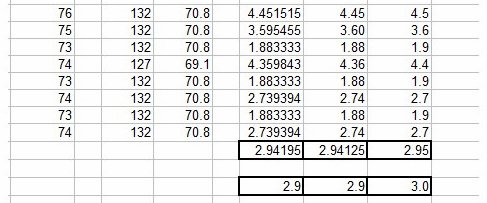Trodski
Member
Hi,
I understand how index is calculated. Best 8 of last 20 score differentials averaged.
Logically it follows that when a counting score is lost/replaced to calculate the change you do; previous counting score - new counting score / 8.
This season I have calculated the expected change and been out by 0.1 a few times. Am I missing something from the calculation? To give you an example;
Previous differential 13.8 - new differential 7.1 = 6.7. 6.7 / 8 = 0.8375. HI reduction should be 0.8?
Actual reduction was 0.9. Anyone know why?
Not that big an issue but 0.1 can change the number of shots you get in knockouts etc.
I understand how index is calculated. Best 8 of last 20 score differentials averaged.
Logically it follows that when a counting score is lost/replaced to calculate the change you do; previous counting score - new counting score / 8.
This season I have calculated the expected change and been out by 0.1 a few times. Am I missing something from the calculation? To give you an example;
Previous differential 13.8 - new differential 7.1 = 6.7. 6.7 / 8 = 0.8375. HI reduction should be 0.8?
Actual reduction was 0.9. Anyone know why?
Not that big an issue but 0.1 can change the number of shots you get in knockouts etc.

